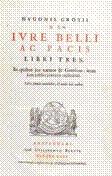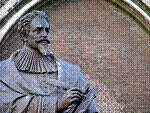Leading Figures in International Law
 Hugo
Grotius
Hugo
Grotius
Hugo Grotius (Huig De Groot) was a Dutch wunderkind of the 17th Century. He was a child prodigy who entered university at age 11, a member of an important diplomatic delegation from his native Holland to France at age 15, awarded a French doctor of laws at age 16, an Attorney General of The Netherlands at age 24. He is now remembered as the “father of international law.” Adam Smith described him in 1762 as “the first…to give the world anything like a regular system of natural jurisprudence.”
 Grotius
was born in Delft, Holland in 1583. After matriculating
at Leiden University in 1594, he was chosen to accompany
a Dutch diplomatic mission to the court of King Henry IV
of France in 1598. The following year the University of
Orléans awarded him a degree of doctor of laws.
Grotius
was born in Delft, Holland in 1583. After matriculating
at Leiden University in 1594, he was chosen to accompany
a Dutch diplomatic mission to the court of King Henry IV
of France in 1598. The following year the University of
Orléans awarded him a degree of doctor of laws.
When Grotius returned to Holland, he began a career in politics. While serving as the Advocate-Fiscal (Attorney General) of Holland, he became involved in a theological controversy between the Arminian Remonstrants and the conservative Gomarists, (a religious controversy that would puzzle most persons living today) which ultimately led to his imprisonment for life in 1619. After a legendary escape (he was smuggled out of his cell in a trunk thought to be filled with books), he lived the remainder of his life (except for one brief period) in political exile in France, Germany and Sweden. He was at one time Sweden’s ambassador to France.
 During
these periods of personal and political turmoil in Europe,
Grotius began to formulate his own ideas on the law of nations
that he saw as a system of mutual legal restraints, based
on the belief that the law emanated both from human reason,
or natural law, and from custom. He authored numerous essays
and treatises and 60 books, among which were De
Jure Praedae (On the
Law of Prize) and Mare
Liberum (Freedom of
the Seas). However, it is De
Jure Belli ac Pacis
(On the Law of War and Peace),
published in 1625, that had the most profound impact on
the development of international law.
During
these periods of personal and political turmoil in Europe,
Grotius began to formulate his own ideas on the law of nations
that he saw as a system of mutual legal restraints, based
on the belief that the law emanated both from human reason,
or natural law, and from custom. He authored numerous essays
and treatises and 60 books, among which were De
Jure Praedae (On the
Law of Prize) and Mare
Liberum (Freedom of
the Seas). However, it is De
Jure Belli ac Pacis
(On the Law of War and Peace),
published in 1625, that had the most profound impact on
the development of international law.
Grotius sought in this latter book to produce a work that effectively addressed the idea of international society, asserting the identity of individual states within the context of a larger community bound together by a body of laws. This formed the basis of the “Grotian tradition” of international society - the idea that while states are the primary actors, both individuals and non-state entities have rights and duties that give them a place in a “great society of all mankind.”
Among the issues addressed by Grotius in his various writings were:
(1) Jus ad Bellum (right to war): Grotius represented a divergence from the ancient just war theory, which gave little attention to the doctrine of self-defense. He believed that actions taken in self-defense fell within the realm of just war. While Grotius’ other views on the justification of resort to war, namely for punishment or for recovery of property are inconsistent with modern interpretations of the jus ad bellum, his main contribution lies in the fact that he put forth strict limitations on the resort to war.
(2) Jus in Bello: Greatly disturbed by the brutality of war, Grotius centralized the notion of jus in bello (rights in war) by making it part of the obligations found under just war theory. He believed states were not unlimited in the ways in which they could pursue war, and that they were obligated to act justly and prudently when conducting and concluding war. Most notably the Hague Conventions of 1899 and 1907 embraced his notion of a prohibition on unnecessary suffering.
(3) Rights of Individuals: Because Grotius endorsed a society of mankind and considered individuals to be actors in international society, he wrote extensively on human law, a precursor of what is today known as international human rights law. He presupposed certain fundamental human rights, such as the right to life, food, and medicine. More importantly though, he argued for the protection of non-combatants during times of war (part of international humanitarian law), an idea that foreshadowed the “protected persons” found in the current discourse on international relations.
(4) Humanitarian Intervention: In general, Grotius was a non-interventionist. However, he did argue that states might be able to act on behalf of individuals who were victims “of injuries which…excessively violate the law of nature or of nations in regards to any person.” Many scholars view this as an implicit justification for humanitarian intervention in certain instances.
(5) Freedom of the Seas: Grotius firmly believed that no state could claim exclusive ownership over any part of the seas, although he did acknowledge the sovereignty of coastal states. In his view, freedom of the seas meant freedom of navigation. There is a direct link between Grotius’ concept of freedom of the seas and the 1982 UN Convention on the Law of the Sea. Although the UN Convention places spatial limitations on the high seas, it built upon Grotius’ ideas and expanded freedom of the high seas to include, in addition to basic navigation, overflight, scientific research, and clearer responsibilities of jurisdiction, protection, and enforcement.
 Hugo
Grotius crafted his work in direct response to the political
situations facing Europe during his lifetime, but which
transcended and had important implications beyond his time
and geographical place. His thoughts and ideas were clearly
discerning as they foreshadowed modern dialogue on international
law.
Hugo
Grotius crafted his work in direct response to the political
situations facing Europe during his lifetime, but which
transcended and had important implications beyond his time
and geographical place. His thoughts and ideas were clearly
discerning as they foreshadowed modern dialogue on international
law.
It is thus appropriate that Hugo Grotius, the “father of international law,” be recognized today as a “leading figure in international law.”
by James G. Apple, Co-Editor, International
Judicial Monitor and President, International Judicial
Academy; and Christine E. White, International Judicial
Academy
